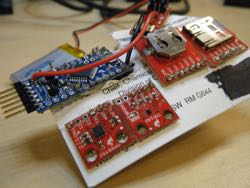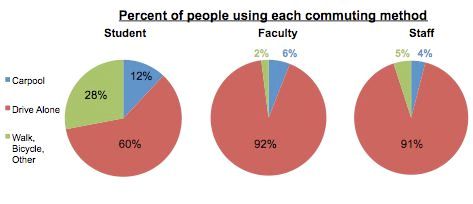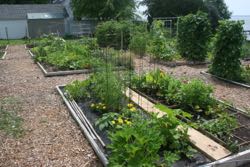Reusable shark tags among $90,000 of approved green-fee projects
The William & Mary Committee on Sustainability has awarded more than $90,000 in funding for spring and summer sustainability projects, including several to individuals and groups at the Virginia Institute of Marine Science.
The Green Fee program began as a grassroots student initiative in 2008. Since then, it has funded more than 200 sustainability projects led by students, faculty, and staff around the William & Mary campuses. This semester saw a wide variety of proposals, from campus-wide initiatives to innovative sustainability research projects. Funded projects include:
Shark Tagging and Signal Analysis in the Chesapeake Bay
 Tagging is crucial for gathering data on aquatic wildlife, but at roughly $3,000 each, the tags are overpriced and under-used. This project, “Sharkduino,” will make low-power, reusable tags for about $200 from existing hardware, including the Arduino Pro Mini. It will also develop signal processing techniques to find out the physical nature and occurrence rate of marine wildlife behavior, which is not well-known. $5,160 awarded to Benjamin Powell '18 and advisors Kevin Weng, assistant professor at VIMS, and Wouter Deconinck, associate professor of physics. Also heavily involved in the project since its inception in fall 2015 is William Laney '18.
Tagging is crucial for gathering data on aquatic wildlife, but at roughly $3,000 each, the tags are overpriced and under-used. This project, “Sharkduino,” will make low-power, reusable tags for about $200 from existing hardware, including the Arduino Pro Mini. It will also develop signal processing techniques to find out the physical nature and occurrence rate of marine wildlife behavior, which is not well-known. $5,160 awarded to Benjamin Powell '18 and advisors Kevin Weng, assistant professor at VIMS, and Wouter Deconinck, associate professor of physics. Also heavily involved in the project since its inception in fall 2015 is William Laney '18.
VIMS Greenhouse Gas Survey Update
This project updates VIMS' greenhouse gas inventory, last updated in 2011. The final survey report, posted to the VIMS website, identifies emission-generating activities and increases awareness of how to modify behaviors.  $5,000 awarded to Kelley Uhlig, SMS ’17 and VIMS Green Team chair, and advisor Carl Hershner, Center for Coastal Resources Management director.
$5,000 awarded to Kelley Uhlig, SMS ’17 and VIMS Green Team chair, and advisor Carl Hershner, Center for Coastal Resources Management director.
Green Gardens
Two projects install or improve community gardens. VIMS’ community garden will get a 450-gallon rain barrel with a solar-powered pump in one project, and in the second, a nutrition garden will be established at Queens Lake Middle School.  $837 awarded for the rain barrel to Pamela Braff, Ph.D. ’19 and advisors Scott Lerberg, Chesapeake Bay National Estuarine Research Reserve stewardship coordinator, and Sarah Nuss, Chesapeake Bay National Estuarine Research Reserve general education and outreach coordinator. $380 awarded to Thomeka Watkins ’19 and advisor Dennis Taylor, VIMS professor emeritus, for the Queens Lake garden.
$837 awarded for the rain barrel to Pamela Braff, Ph.D. ’19 and advisors Scott Lerberg, Chesapeake Bay National Estuarine Research Reserve stewardship coordinator, and Sarah Nuss, Chesapeake Bay National Estuarine Research Reserve general education and outreach coordinator. $380 awarded to Thomeka Watkins ’19 and advisor Dennis Taylor, VIMS professor emeritus, for the Queens Lake garden.
James River Park System Invasive Species Research
The James River Park System in Richmond has launched a citizen-science program to map non-native invasive plant species. This project validates the data and methods of volunteers by mapping the actual cover of invasive species in a subset of the 83 management units. The research has implications for citizen science and on the use and publication of this methodology. $4,750 awarded to Jesse Smyth ‘18 and advisor Doug DeBerry (VIMS Ph.D. 2006), visiting assistant professor of biology.
Recycling Bins
Four projects will provide new recycling bins at VIMS, the Dillard Complex, and in three academic buildings and outdoor locations on main campus. $7,629 to Kelley Uhlig, M.S. ’17, VIMS Green Team chair, and advisor Mark Brabham, director of facilities management.
A full accounting of the 15 projects funded during the spring 2016 Green Fee competition are available on W&M's Sustainability website.

